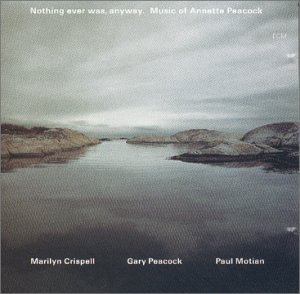
Marilyn Crispell (plays the music of Annette Peacock): Nothing ever was, anyway.

Women's History Month at HurdAudio returns to the fantastic piano improvisation of Marilyn Crispell, and her trio with Gary Peacock on bass and Paul Motion on drums, as they play the music of Annette Peacock on Nothing ever was, anyway from 1997.
This double CD opens and ends with different versions of the title track. In version 1, "nothing ever was, anyway" begins as a single melodic line played slowly on the piano with the sustain pedal held down. Occasionally the monophonic line is broken up with an accompanying note here and there. More than two minutes into the piece the drums and bass enter with little more than a few notes and some soft gestures on the suspended cymbals. Given the explosive quality of Crispell's improvising that I've come to love and expect from her this is some severely restrained playing. It's intoxicating to hear so much focused improvisation to produce such a spare sound. The melodic line slowly unfolds with haunting clarity. Gary Peacock shifts into focus for a solo about two thirds of the way in. Motion plays some extremely soft semi-pulsating drum material as the bass follows up on the delicate, quiet mood of this composition. This is great improvisation territory. I could listen to this trio all day.
The remainder of this listening experience follows in this textural vein as this piano trio explores the ballad compositions of Annette Peacock. Each composition seems "barely there" and yet so rich with interpretive detail. Melodic lines move slowly and seem to breathe as subtle harmonic parts lend just the right support for a mood of solitary contemplation.
"Cartoon" offers a short contrast to these ballad textures as the tempo picks up. Crispell improvises on some whimsical lines as Motion plays some sympathetic and responsive material. This piece opens the improvisation valves just a little bit wider to allow more density while holding to the overall quiet dynamic of this listening experience. This is a breath of sonic variation that fits well with this collection.
"Dreams (If Time Weren't)" adds Annette Peacock's vocals to the group revealing for a single track the quality of the poetry lurking behind these exquisite melodies. The intonation of this voice is stunning and the sustain on the end of each phrase is an exact match for Crispell's interpretative take. The voice pans across the stereo field on some of the held tones momentarily breaking the spell of an otherwise minimally produced sound. The trio paints around the voice with light strokes as the focus drifts between each performer.
"Both" begins with light sheets of sound cascading down the piano suggesting a slightly faster tempo for this track. Then settles in for a quiet interplay between these performers that places Crispell's incredible technique and improvisational sensibilities at the center of this sound. To my ears, this is the strongest track in this collection. This texture is thick with activity even as the sound seems to whisper just beyond the reach of consciousness at times.
"You've Left Me" opens with a great unaccompanied bass solo. A strummed chord, a note, a melodic line, then another strum and an extended melodic line. Then Crispell and Motion enter into the sonic picture. The interactions between these players are richly rewarding to follow and observe as they respond to one another and spin off ideas within this spartan texture.
"Blood" is a brief, layered texture affair. Crispell presents the slow moving melody as the bass and drums churn a rapid, yet quiet, pattern that evokes a sense of standing in the midst of the life that circulates around us. The melody builds and reaches into higher registers adding a sense of tension without disrupting the sonic texture. This is a beautiful sound (and at this point Paul Motion is rapidly becoming one of my favorite drummers).
This listening experience closes on a generous second take of "nothing ever was, anyway" that sustains the somber mood of this session while offering a glimpse into the breathtaking detail and variation at work on these arrangements.


No comments:
Post a Comment